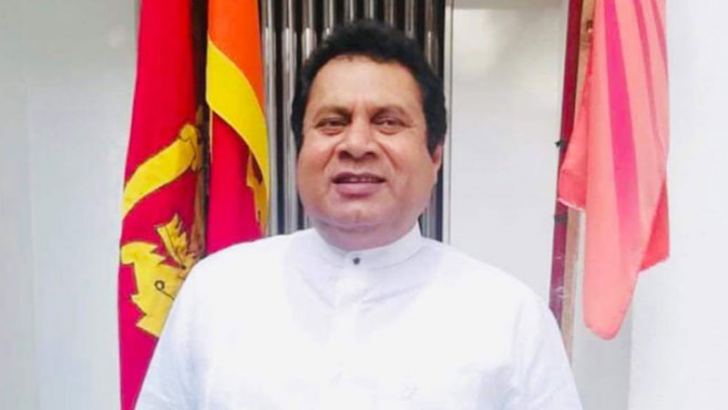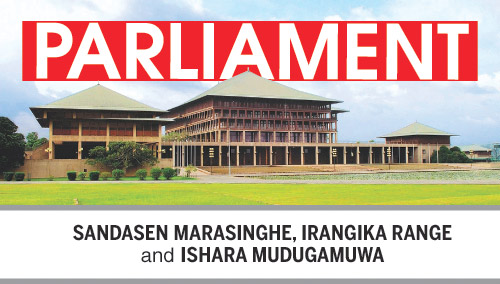Govt to cut Customs’ revenue leakages - Ravi
The government plans to minimise the revenue leakages of the Customs Department through the implementation of modern technologies and good governance policies, Finance Minister Ravi Karunanayake told in Parliament yesterday.
Minister Karunanayake said the government expects to increase the income of the Customs Department up to Rs. 700 billion by the year end with the installment of a new container scanning system.
Responding to a question raised by UNP Matara District MP Buddhika Pathirana, Minister Karunanayake said the Customs Department registered an income of Rs. 385 billion in 2014. It was around Rs. 490 billion in 2015.
He said the new container scanning system along with a CCTV camera system will be installed within the next two three months. The new facility will increase income generation in the department as new taxable items will be scanned, he said.
Financial Transactions Reporting Act to be amended
The Financial Transactions Reporting Act No 6 of 2006 (FIRA) is scheduled to be amended during 2016, National Policies and Economic Affairs State Minister Niroshan Perera said.
He was responding to a question raised by UPFA Minister Vasudeva Nanayakkara in Parliament yesterday.
“Following a decision taken at the meeting of the Advisory Board to the Financial Intelligence Unit (FIU), a committee was established to review the current legislation relating to money laundering and terrorist financing and to propose amendments in line with global developments, he said.
According to the State Minister, the committee comprises the representatives of the Attorney General’s Department, Legal Draftsman Department, Financial Intelligence Unit, Finance Ministry, National Policies and Economic Affairs Ministry and the Police.
The State Minister said the amendments proposed to the FTRA are at an advanced stage, with the draft to be revisited by the Legal Draftsman’s Department and to be submitted for the Attorney General’s clearance.
“The powers and functions of the Financial Intelligence Unit are mandated by virtue of three laws, namely, the Financial Transaction Reporting Act No. 6 of 2006, Prevention of Money Laundering and the Conversation on the Suppression of Terrorist Financing Act, No 25 of 2005,” he said.
He said the FIU is empowered to collect information of the bank accounts maintained by Sri Lankans in foreign jurisdictions only to establish the conduct of unlawful activities as specified under the Financial Transaction Reporting Act, No 6 of 2006 or an offence of money laundering or financing of terrorism as respectively referred to in the Prevention of Money Laundering Act No 5 of 2006 and the Convention on the Suppression of Terrorist Financing Act, No 25 of 2005.
“Collection of any information from foreign jurisdiction is subject to laws and regulations applicable to respective foreign jurisdictions,” the State Minister said.
He said the FIU does not have the power to arbitrarily collect information or carry out a survey, to establish the number of Sri Lankans that have opened foreign bank accounts or amounts under their names in such accounts.
Homoeopathy Bill passed with amendments
The Homoeopathy Bill was passed in Parliament yesterday with amendments.
The Bill was presented by Health, Nutrition and Indigenous Medicine Minister Dr. Rajitha Senaratne on June 7. The Bill replaces the Homoeopathy Act of 1970.
The new Act provides for the establishment of a Homoeopathic Medical Council; for the registration of Homoeopathic Practitioners and Homoeopathic Pharmacists; for the registration and regulation of Homoeopathic Institutions; to promote, foster, and regulate the Homoeopathic system of medicine and for the regulation and control of the manufacture, importation, storage, sale and distribution of homoeopathic medicine, drugs and other homoeopathic preparations.
The Minister moving the Bill for the debate, said the Homoeopathy Act had not been amended for 45 years, adding that the new Bill addresses the loopholes of the previous legislation. He said about 150-200 patients obtain treatments at the Welisara Homoeopathy hospital daily mainly for joint pains, asthma, child and women illnesses.
“Unlike western medical treatment that provides external immunisation, the Homoeopathy treatment enhances natural immunisation in the body. Medicine used in Homoeopathy is made of natural substances such as herbs and parts of animals. Adverse effects in them are low,” he said.
“The medicine is also comparatively cheap and easy to use. We need to encourage the promotion of the Homoeopathy medical system,” he said.
Tourism industry gathers momentum
The first quarter of this year has shown a significant growth in the tourism sector, the ‘Quarterly Report on the Economy’ tabled in Parliament yesterday stated.
The report was tabled by Chief Government Whip and Minister Gayantha Karunathilaka on behalf of Prime Minister Ranil Wickremesinghe.
As of the report, the arrival of tourists had gone up by 22.1 percent. The income from tourism had increased by USD 969.3 million.
The report indicates that the inflation of the country had increased according to three main indexes. Headline Inflation (year-on-year) based on the Colombo Consumers’ Price Index (CCPI, 2006/7=100) increased to 4.8 percent in May 2016 from 3.13 percent in April, 2016.
The annual average inflation increased to 1.7 percent in May 2016 from 1.3 percent recorded in the previous month. Based on CCPI, year-on-year core inflation, which measures underlying inflation in the economy, increased to 6.6 percent in May 2016 compared to 4.5 percent in April 2016.
Following a similar trend, the annual average core inflation increased to 4.5 percent in May 2016 from 4.1 percent in the previous month, the report said.
Headline inflation (year-on-year) based on the National Consumer Price Index (NCPI, 2013=100) which covers all provisions in the country, increased to 4.3 percent in April 2016 from 2.2 percent in March 2016.
The annual average inflation edged upto 2.6 percent in April 2016 from 2.4 percent recorded in the previous month, it said.
Earnings from exports declined by 5.4 percent, year-on year, to US dollars 2,728 million in the first quarter of 2016 compared to US dollars 2,884 million recorded in the first quarter of 2015, largely due to the impact of the weak global demand.
Export earnings of transport equipment, petroleum products, gems, diamonds and jewellery, spices and tea mainly contributed to this decline, according to the report.
The rupee recorded a depreciation of 1.3 percent against the US dollar during 2016 upto June 6, the report added.
The report stated the economic growth in 2015 had been 4.8 percent and that there had been growth in the agriculture, industry and service sectors.
About 3,136 acres in North and East released for resettlement since 2015
About 3,136 acres of private lands which were under the State authorities have been released for the resettlement of the IDPs in the Northern and Eastern Provinces since 2015, an answer tabled in Parliament by Prison Reforms, Rehabilitation and Hindu Religious Affairs Minister D. M. Swaminathan said.
It said upto now 1,578 families comprising 4,046 persons were resettled.
“In the Northern Province, 7,618 acres of private lands that belong to the IDPs are still under the State authorities. Of these, 5,606 acres are in the Jaffna district.
The number of IDP families to be resettled in the Northern and Eastern Provinces is 12,505 families.
The IDPs to be resettled in the Jaffna District is 10,775 families,” the answer stated.
The answer said there are 32 welfare camps in the Northern Province of which 31 camps are in the Jaffna District and one camp is in the Vavuniya District.
“There are 1,068 IDP families in the welfare camps of which 641 families are landless families,” it added.
MP proposes exam for SAITM students to win medical practice
UPFA Galle District Parliamentarian Ramesh Pathirana yesterday proposed the government to introduce an examination similar to Act 15 for SAITM students to allow them to practise medicine in Sri Lanka.
He made this proposal joining the debate on the Second Reading of the Homeopathy Bill. This is the only way of ensuring justice for SAITM graduates without damaging the quality and the reputation of country’s medical profession.
The continuous struggle of the medical students and the medical professionals is not against SAITM students, but against the procedure followed by the SAITM.
“As a medical professional, I do not oppose private medial institutions since we can save a large amount of money spent on foreign medical degrees. But there should be a proper regulatory mechanism to regulate these institutions, the MP said.




Add new comment